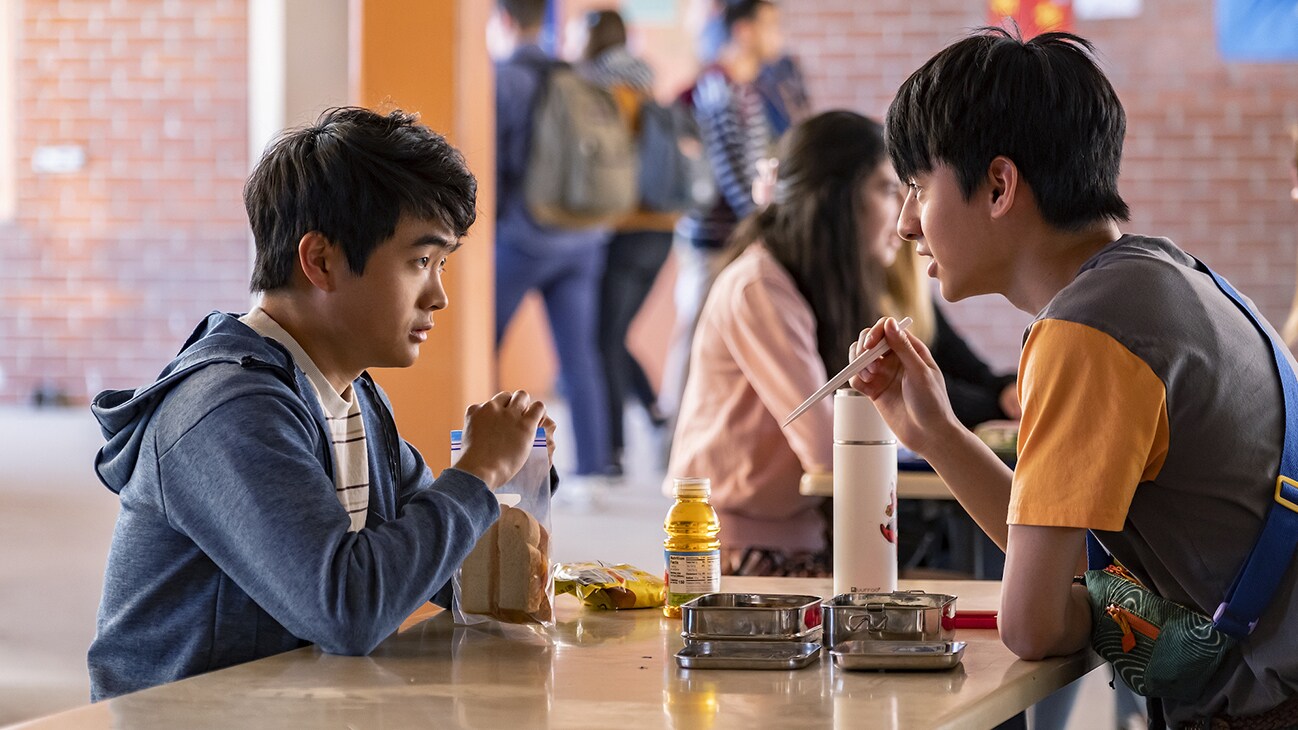Gene Luen Yang never expected his graphic novel to be read by the multitudes … or by anybody.
“I actually did ‘American Born Chinese’ as a Xeroxed comic,” he told the Television Critics Association. “I would finish a chapter; I’d take it to my local Kinko’s. Remember Kinko’s.
“I would staple it by hand and I’d sell like 16 copies. It would be like 15 of my friends and my mom.”
He’s way past that now. On Wednesday (May 24), Disney+ debuts the entire eight-part “American Born Chinese” mini-series (shown here). In the 17 years since it was formally published, it’s caught on big.
“It’s a seminal work of literature,” said Kelvin Yu, creator of the mini-series. “They teach it in universities. They teach it in high schools. It’s featured in libraries all across the nation.”
Now it’s part of a belated surge in Asian stories and characters. It:
— Has supporting roles for two current Academy Award winners. Michelle Yeoh and Ke Huy Quan won the best actress and support-actor awards in “Everything Everywhere All at Once.”
— Will be followed Thursday (May 25) by the movie “Shang-Chi and the Legend of the Ten Rings,” from 8-11 p.m. on the Disney-owned ABC.
At some points (shown here), “American Born Chinese” is your standard teen comedy-drama, with Yu – la ong-time “Bob’s Burgers” writer – inserting appealing bursts of humor. Like many teen stories, it’s about someone who’s slightly different, but doesn’t want to be.
That’s familiar turf for Yang, 49, who was one of the few Asians in his California schools. A generation later, it’s familiar to Ben Wang, who stars.
“I grew up in Minnesota, in a small town (so) a lot of it rang true for me,” Wang said. It’s the standard teen story plus one: “You have to deal with all of the normal hormones of being a teenager, and on top of that, you have to deal with this clashing of cultures.”
For many kids, he said, there’a a tug. “Your parents call you something different than your friends. You speak a different language at home than you do at school. You act differently than you do at school.”
Overlaid on that is a different sort of story, filled with epic characters from Chinese legend. Before we even meet the teens, we see spectacular, supernatural scenes; by the end of the first hour, the legendary figures have reached the modern, high school hallways. That provided room for major stars:
— Playing the Monkey King is Daniel Wu, who became “a massive international movie star” after moving to Hong Kong, Yu said. That involved adapting as an outsider, Wu said. “I am Chinese, but I grew up here in the U.S. So there was always a sense that I was slightly foreign to them” – or, later, to Americans, when he was “the only Asian person on set.”
— Playing the Goddess of Mercy is Yeoh, a former Miss Malaysia who spoke English and Malay before adding Chinese and becoming a Hong Kong star. People “always acted so surprised. They would say, ‘You speak English!’ (I’d say,) ‘The flight coming here was, like 13 hours, so I learned it on the way.’”
In the U.S., her career soared with “Crazy Rich Asians,” a James Bond film and then “Everything.”
— Quan is a Vietnamese native who co-starred in an Indiana Jones film at 13, but later spent decades away from the camera, when few Asian actors were being hired. Now – fresh from his Academy Award – he has an offbeat role: We see him in scenes from a dim-witted 1970s comedy with offensive Chinese stereotypes. It’s being passed around the internet, to the despair of modern Asian teens.
“I was so reluctant to take on this role,” Quan said, “just because of what people would think about it
…. Some are going to be very angry with it; some are going to think it’s funny …. I went through that range of emotions.”

Once a Xeroxed comic, it’s now a mini-series and more
Gene Luen Yang never expected his graphic novel to be read by the multitudes … or by anybody.
“I actually did ‘American Born Chinese’ as a Xeroxed comic,” he told the Television Critics Association. “I would finish a chapter; I’d take it to my local Kinko’s. Remember Kinko’s.
“I would staple it by hand and I’d sell like 16 copies. It would be like 15 of my friends and my mom.”
He’s way past that now. On Wednesday (May 24), Disney+ debuts the entire eight-part “American Born Chinese” mini-series (shown here). In the 17 years since it was formally published, it’s caught on big. Read more…